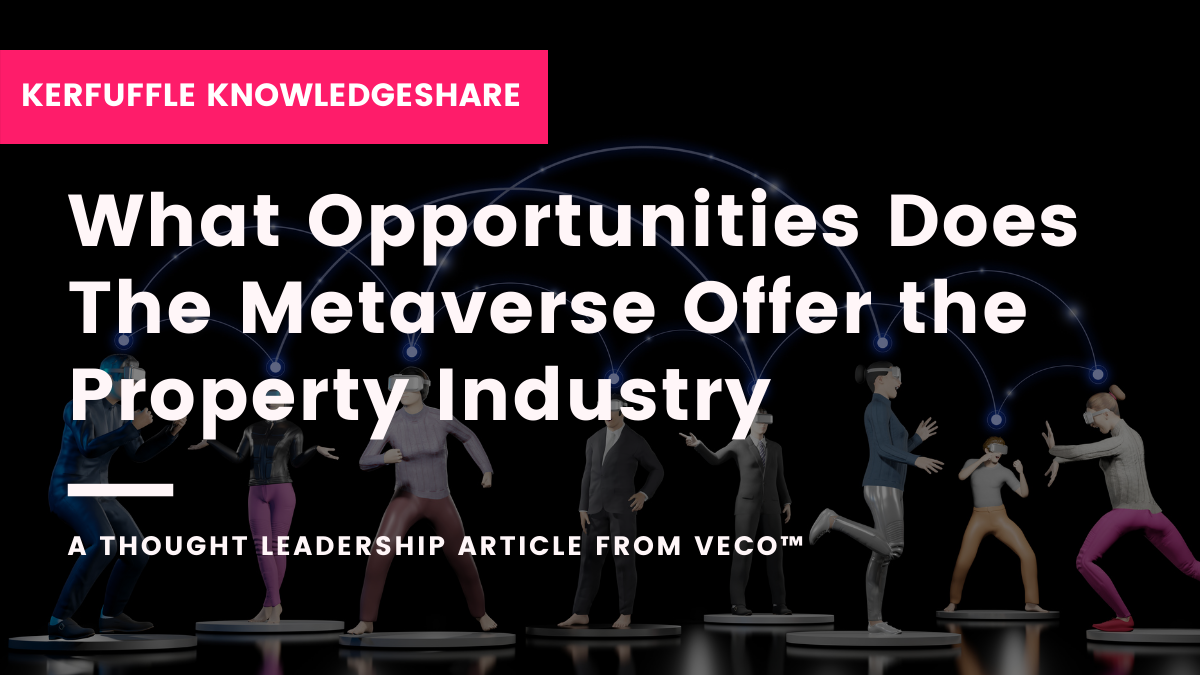Here is a thought leadership article from Veco™️
The concept of the ‘metaverse’ has attracted much press interest of late, covering the emerging appetite for metaverse investment opportunities, a recent virtual land boom, or where crypto, gaming and capitalism collide.
Who is Veco™️?
Veco™️ will revolutionise the way your property company works.
Our leading software solution Veco™️ offers a comprehensive all in one property package, enabling our clients to carry out core business processes efficiently and to the highest standards possible.
Combining innovation, integration and automation, Veco™️ provides a software platform to help you grow your business.
Our mission has been to deliver unique and user friendly functionality tailored to each department and their users.
Click here to find out how Veco™️ can help your agency
The concept of the ‘metaverse’ has attracted much press interest of late, covering the emerging appetite for metaverse investment opportunities, a recent virtual land boom, or where crypto, gaming and capitalism collide.
The term ‘metaverse’, which comes from Neal Stephenson’s 1992 science fiction novel ‘Snow Crash,’ is used to refer to the development of virtual reality and augmented reality technologies. The grand concept is that the metaverse will be the next iteration of the mobile internet and a major part of both digital and real life.
The new era of the metaverse will have implications on all aspects of society, including investment, entertainment, advertising, and the economy. For example, you can invest and make money just like in the real world and one of the most popular ways to do this will be investing in property.
Metaverse real estate is already big business. Superstars, including Snoop Dog and global businesses including PwC, JP Morgan, HSBC, and Samsung, have already purchased up plots of virtual land, which they intend to develop for a variety of purposes. Those who got in early have already made big returns – on paper, at least.
Less than a year ago, the average price for the smallest plot of land available to buy on Decentraland or the Sandbox – two of the biggest metaverse platforms – was under $1,000. Today it’s sitting at around $13,000.
Despite the infancy of the metaverse, the world’s first virtual real estate company, Metaverse Property has launched to facilitate the acquisition of virtual property, along with a suite of virtual real estate centric services that are provided by pioneers of the crypton, blockchain and non-fungible token (NFT) industries.
For the metaverse to become a reality, successfully linking current gaming and communications platforms with other new technologies into a massive new online destination – many obstacles will have to be overcome, including significant legal issues. Some of these include:
- Personal Data, Privacy and Cybersecurity – Privacy and data security experts are already challenged with addressing the global concerns presented by varying international approaches to privacy and growing threats to data security.
- Technology Infrastructure: The metaverse will be a robust computing-intensive experience, highlighting the importance of strong contractual agreements. Performance commitments and service levels will take on heightened importance in light of the real-time interactions that users will expect.
- Ownership of intellectual property: Late last year, it was announced that Nike had filed seven trademark applications in preparation for its entrance into the metaverse. The trademark application was for, inter alia, downloadable virtual goods, retail store services featuring virtual goods and entertainment services featuring virtual footwear and clothing for use in virtual environments. In the physical world, the ownership can be attributed to the actual physical property. With digital/virtual items and properties in the metaverse, the buyer may own the property, but not its intellectual property and its true ownership may still lie with its true owner ie. the creator.
- Anti-competitive concerns: Collaboration amongst competitors may invoke antitrust concerns. Larger technology companies may be perceived as leveraging their position to assert unfair control in any virtual world.
- Intellectual property issues: A host of IP issues arise, including infringement, licensing and IP protection. The use of virtual images and virtual performances may lead to concerns over use of image rights and copyright, and dealing with different approaches in different jurisdictions.
- Anti-money laundering: Financial crime and anti-money laundering activities have always been an issue in cryptocurrency transactions, and it is foreseeable that it will take place in the metaverse as well. Criminals may shift their money derived from illegal activities, converting it to virtual or cryptocurrencies and spending it on the goods and services in the metaverse.
The metaverse is exciting, but we will have to wait and see if the current vision of the metaverse will translate into long-term, concrete commercial and civic-minded opportunities. Ultimately, there are many legal issues that need to be resolved, before creating and participating in this new virtual world concept.
Click here to find out how Veco™️ can help your agency



